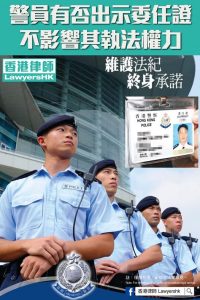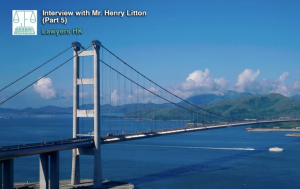
Whether or not a police officer produces his warrant card does not affect his power to execute his lawful duties
Chapter 20-14 of the Police General Orders specifies when a police officer has to produce his warrant card. However, the Police General Orders are not part of the law, but instead are internal guidelines or rules made by the Commissioner of Police under Section 46 of the Police Force Ordinance (Cap. 232) to regulate the behaviours of the police officers. Whether or not a police officer produces his warrant card does not affect his power to execute his lawful duties. Any violation of the Police General Orders is a disciplinary matter, but not an offence. A determination on whether a police officer has breached the Police General Orders and its consequences should be made by the police internal disciplinary tribunal.
According to the relevant rule/guideline, a police officer in plain-clothes, when dealing with members of the public and exercising his police powers, shall identify himself and produce his warrant card. As to uniformed police officers, they are generally not required to voluntarily produce their warrant cards, unless upon request by members of the public, in which case they shall produce their warrant cards unless (1) circumstances do not allow; or (2) to do so would prejudice the police action and/or safety of the officers concerned; or (3) the request is unreasonable. If a uniformed police officer is unable to produce his warrant card at the time of the request as required by paragraphs (1) and (2) above, the officer shall produce his warrant card as soon as the circumstances permit. Where a group of uniformed police officers is operating together, only one of the uniformed police officers present shall produce his warrant card upon request.
The original intention of making the above order was to prevent anyone from impersonating any police officer and to protect ordinary citizens, and should not be used by any uncooperative citizen as an excuse to obstruct the police from carrying out their lawful duties.






